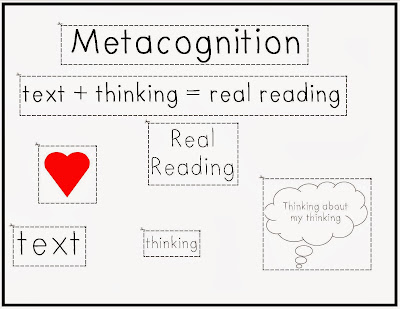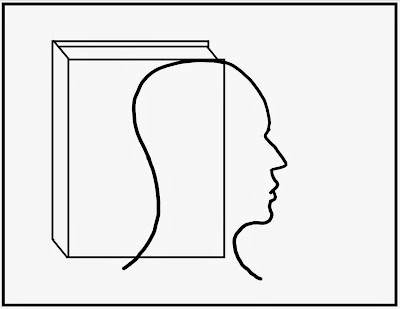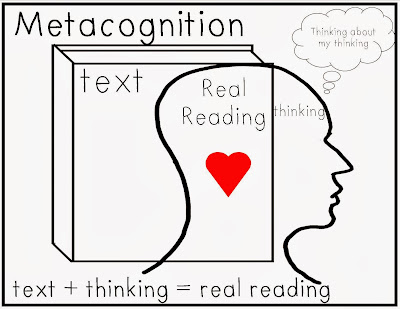thrilled...nope...HONORED to be here. My blogging journey started just 1 1/2 years ago with my teaching partner, Maria. I didn't realize how much I would enjoy writing, sharing, and learning in this blog world! And to be a part of Adventures in Literacy Land--WOW! I look forward to this journey.
Just a little bit (more) about me--After teaching in the classroom (1st and 2nd grade) for 5 years, I requested to be a Title I teacher. I no longer pull students out of the classrooms, but co-teach with the first grade teachers in my building. The classroom teacher, intervention specialist, and I split the class up into groups and TEACH! At times, we do some whole group lessons together.
And that leads me to our focus for today. After winter break, my Reading teammate and I decided to start the 2014 year off with some concrete lessons on metacognition. We turned to Tanny McGregor for some assistance with these lessons.
We read "Comprehension Connections" and saw her speak at the Ohio Literacy Conference this past year. We listened...we tried...and we were so excited with how well the lessons went!
Day 1: The lesson started with me doing some "fake" reading. We discussed what "fake" reading is and how we are all guilty of this. I explained that if you are not thinking when you read, then you might as well stop reading because there is no purpose. Then I threw the book across the room.
I think the shock value of throwing a book paid off because they remembered (throughout the week) that there is no purpose to "fake" reading.
This led us right into the main part of lesson--thinking about your thinking (or reading). Tanny suggests making this lesson concrete with a reading salad.
I modeled this with the book "Wolf!" and then we invited students to do the thinking.
Day 2: When class started, we asked our firsties to tell us about metacognition.
Sure enough, they could! The concrete lesson was all that Tanny said it would be! They really understood the importance of real reading. Karen explained that some students learn by making something (like the salad) and some learn through a graphic organizer.
 | |
| (This is the "pretty" version my husband made for me.) |
Day 3: The lesson started with our firsties explaining this poster. I have to say that out of all our classes, our struggling readers did the best job! They could explain every part and the importance of it. Our study of metacognition ended with think bubbles. I read the text and our students shared their thinking inside a large thinking bubble.
Karen and I also tried to stress that in order for your brain to think about your reading, you need to read with fluency. We came up with some ways to make this concrete and hands-on as well. If you want to read more about that just click HERE.
We would like all of our students to have their own copy of this poster. The following document is a blank version of the poster. Students can either write in the "parts" of metacognition or cut/glue them. If you would like to use this, please click on the image to grab it!
 |
I look forward to observing the impact that these lessons will have on the reading that occurs in our classroom! Happy thinking about your thinking!












I LOVE THIS! I just ordered the book you referenced and downloaded the pictures for the kids to have. My students love making connections, but I love the idea of reinforcing the idea of always thinking when you read - too much fake reading a lot of the time.
ReplyDeleteI love your new blog, too. Thanks for the great ideas!
Susan-I am so glad that you like the pictures! I hope your students enjoy the lesson as much as we did!
DeleteEm
That is one of my favorite books! We were assigned it in my master's program, and it's the one I've clung to the most. Metacognition is SO important for students to understand!
ReplyDeleteDon't Let the Teacher Stay Up Late
Follow me on Bloglovin!
You are so right Melissa!! But it is not something we always think that we need to teach. But we do, for sure!! They need to realize that they REALLY are thinking when they read :)
DeleteEm
You did a wonderful job explaining this to both your students and readers. I plan to take time to use your lesson with my upper elementary readers too as they are at a critical point, and often, they become word callers because they focus so heavily on decoding and fluency vs. thinking as they read. I appreciate the wonderful handouts as they give a great visual model for explaining.
ReplyDeleteThanks so much Carla!! I can't wait to hear how your students respond. It amazes me to hear our little 6 years old using the word metacognition in all their other subjects. It really hits home with me how effective the concrete example was.
DeleteEm
This comment has been removed by the author.
ReplyDeleteSo love this activity! I used to use it all the time with my students but haven't been able to with our new reading program. I may need to do these with my fourth graders who just don't think when they read! I love this book too!
ReplyDeleteAndrea
Reading Toward the Stars
Thanks Andrea! This is the first time that we have tried this activity. I am 100 percent positive it will be a yearly event now :)
DeleteI will definitely be doing this with some of my readers who are notorious "fake readers." I think this will help them realize the difference! Thanks so much!!
ReplyDeleteKelli
Tales of a Teacher
I hope it goes well! It was funny to listen to their "confessions" of being fake readers sometimes. It was a good conversation to have with them.
DeleteThis was a fabulous post Em and I agree with Carla, I think the approach you have taken is critical for readers at all year levels and it's certainly one I would advocate for those in middle and upper primary as well. I just love your posters and your explanation - very inspiring! Thank you :)
ReplyDeleteKylie
Ripper Reading Resources
Thanks Kylie! The kids really liked the posters. They made them and took them home. Many came back the next day and had them signed by a parent (meaning: the student explained the poster to their family!)
DeleteYou've taught such valuable lessons about metacognition that will be instilled for years to come with your little firsties. I loved seeing the pics of the reading salad too. Bravo on a job well done!
ReplyDeleteEmily
The Reading Tutor/OG
Thank you Emily! It is a lot of fun to hear them using the word "metacognition." They sound so grown up!
DeleteLove this lesson. We did this book as part of our Professional Development last year. It is one of my all time favorites! I especially like how she uses different media (books, music, art) to help the kids understand these different reading strategies. Awesome! Thanks for sharing!!
ReplyDelete♬Kay
On the Trail of Learning
Thank you Kay! I am so jealous that you got to do it as a whole building! That would be a lot of fun and I think we would all learn so much from each other. I look forward to doing more lessons in the book.
DeleteI love that your kids now actually know and understand the word metacognition! That is amazing!
ReplyDeleteAfter all of the great posts about this book, I think I may have to suggest it as a book study at school.
I love the way you introduced the idea of "fake" reading to your kids. This is what so many kids do, especially at a young age because they are so focused on decoding and accuracy. What a great lesson. I will be trying (and sharing)! Thank you!
Jessica
Hanging Out in First1
Thank you so much Jessica! I was so amazed that they now use the word metacognition! It is so cute to hear the big word come out of their mouths :) I can't wait to hear how it turns out in your classroom!
DeleteEm
Great job , Em! Looks like I have another book to add to my reading list! I know this is something that would definitely help several of my readers. They will "call" the words out but have no idea what they have read. They are not interacting with the text. Thanks for sharing!
ReplyDeleteKelly
I'm Not Your Grandpa, I'm Your Teacher
Of course, Kelly!! I would love if you read this book. Then we could talk about it and share all of our ideas!! Can't wait!
DeleteEm
I LOVE your metacognition poster. We are working on metacognition this quarter and your resources will be extremely helpful.
ReplyDeleteI would love for you to check out my blog, http://msthirdgrade.blogspot.com/.
:)
I am so glad that it was helpful! It is a skill we will be working on the rest of the year, for sure! :)
DeleteEm